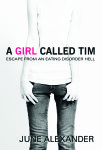‘Coming out’ with an eating disorder – so glad I did
‘Coming out’ with an eating disorder – so glad I did

My memoir, A Girl Called Tim is available on Amazon.
Fifty-one years ago, in 1962, I developed anorexia. I was 11 years old.
An eating disorder is like a bully in the brain. It sabotages thoughts and feelings, and manipulates behaviour. It draws you away from loving relationships, and discourages the sharing of fears and uncertainties. The eating disorder pretends to be your friend – ‘you can count on me, I won’t let you down’. This ever-present voice is convincing and comforting. But its effect is to isolate, alienate and, unless confronted, kill.
The longer the eating disorder resides in the brain, the harder it is to evict. It makes itself at home very quickly, like a squatter supreme. I know. This invisible, silent intruder penetrated every part of my mind, stole my personality. Not once did I think of asking for help. I did not know my brain had an illness. I felt inferior to all and weak-willed for not being able to cope like everyone else. By my late 20s, I was suicidal. The bully was about to win. Claim another victim. But I had an ace card. My children. They gave me the strength to defy the bully and share my dreadful secret with a doctor. Six years passed – diagnosis after diagnosis, so many layers to work through. Finally a correct diagnosis: a chronic eating disorder, chronic anxiety and depression. The eating disorder rebelled. In my 30s by now, the illness was embedded in my thoughts and behaviours. It took 25 years to disentangle the monster bully from my brain, and replace it with thoughts and behaviours that were true to me.
People talk about ‘coming out’ in terms of gays and lesbians. I can relate to this. I ‘came out’ as a ‘person with an eating disorder’ at age 55, the year I regained me, in 2006. For 44 years, I had been a ‘closet’ eating disorder sufferer. My eating disorder had been a shameful, guilt-laden, soul-destroying secret.
In the darkest moments of my illness I had clung to an unshakeable belief that if I could get the illness into the open, expose it in the light, it would not survive. An eating disorder is devious; it likes to hide. Shining a bright light, raising awareness – this, I knew without doubt, was the way to exterminate it. This thought sustained me at my sickest points. Upon recovery, I became dedicated to providing a beacon of hope for others. A pen was my tool, my sword. I transitioned from newspaper journalist to writing books about eating disorders. I began attending conferences on eating disorders and amazing things began to happen.
One of the biggest revelations was that I began to meet advocates and researchers in the eating disorder field who knew all about my illness and yet respected and treated me with dignity. They treated me like a real person. To receive such acknowledgement and acceptance helped enormously in building and strengthening my fledgling self-belief and confidence.
‘Coming out’, and turning the darkness of the illness into the light of awareness, has been the best possible strategy in maintaining health and preventing relapse.

At Home with Eating Disorders – first national conference in Australia for families and carers
Which is why, seven years into recovery, I am proud to be on both the main organising committee and co-chair of the program committee for Australia’s first eating disorder conference for families and carers: the At Home with Eating Disorders conference, May 23-25, Brisbane.
See you there!
I look forward to much growth stemming from this conference.
My passion always, is to help provide hope, a light, a way ahead, for those who are suffering in silence.





